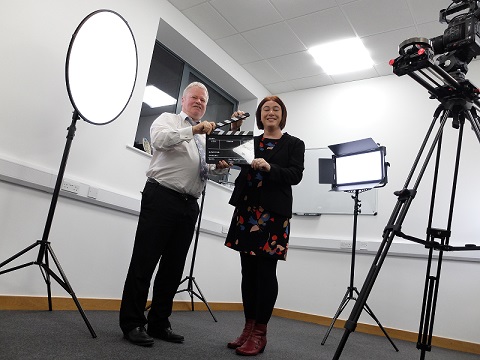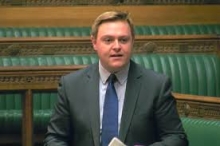Work TV
Watch our TV Channel dedicated to the ‘World of Work’. Explore our video library for informative videos featuring career opportunities at leading companies, franchising opportunities, further education and recruitment professions and their services.
Simon Collyer
Employment Bill Passes Both Houses of The Oireachtas
Employment (Miscellaneous Provisions) Bill was passed by both houses of the Oireachtas and will now be presented to the President for his signature. Commencing in the first week of March 2019, the Bill seeks to address the challenges thrown up by the increased casualisation of work and to strengthen the regulation of precarious employment.
Hailing the Bill as is one of the most significant pieces of employment legislation in a generation.
The main provisions of the Bill are as follows:
Employers must give employees basic terms of employment within five days;
Prohibits zero-hour contracts except in situations of genuine casual employment and where they are essential to allow employers to provide cover in emergency situations or to cover short-term absence;
A new minimum payment for employees called in to work but sent home again without work;
Banded Hours provisions: a new right for employees whose contract of employment does not reflect the reality of the hours they habitually work whereby they will be entitled to be placed in a band of hours that better reflects the hours they have worked over a 12-month reference period;
Anti-penalisation provisions: The Bill provides strong anti-penalisation provisions for employees who invoke their rights under this legislation.
ABC Comment, have your say below:

Happy Christmas To All Our Followers, Thank You For Your Support
Christmas is a hard time for those on low incomes. People can feel VERY depressed. None the less:
A VERY Happy Christmas to all our followers. It has been a very exciting year for the ABC and 2019 promises much more.
We are going into Christmas craving for a rest. I am not sure we will get it in full, but we are sure looking forward to a break.
Have a very Happy Christmas once more.
All the Very Best from the ABC Team.
ABC Comment, have your say below;

A Recession on the Way?
The ABC has been arguing that a recession might be on the way.
Karl Marx prophesied that capitalists would drive down wages till a point that the workers could no longer afford the goods that were being produced. Capitalism would eventually destroy itself. 2018 saw the 200th anniversary of his birthday.
China has been the great engine of prosperity, but the Chinese economy has been slowing down.
The Nasdaq is not the only the part of the market in distress says the New York Times this week. The Russell 2000 index, which tracks shares of smaller companies, entered a bear market earlier this week. Seven of the S&P 500’s 11 industrial sectors are also at the level, led by energy stocks, which are down 28 percent from their highs earlier this year. That’s in large part because crude oil has been in a bear market since November.
Equities have looked overvalued in the US and this correction is inevitable.
Meanwhile in the UK:
According to a Guardian article: Up to 85,000 retail jobs disappeared from Britain’s high streets in the first nine months of this year after a surge in the number of businesses going bust and closing stores.
Nearly 1,000 retail businesses – from big employers such as House of Fraser, Evans Cycles and Poundworld to independent traders – went into administration between January and September, according to new data seen by the Observer, the highest number in five years. A further 26 big companies, including New Look, Carpetright, Mothercare, and Homebase, opted to close stores or cut rents using an insolvency procedure known as a Company Voluntary Arrangement – up 73% on the same period last year.
The figures raise further fears about the future of Britain’s high streets, where the number of premises lying empty soared by more than 4,400 in the first six months of 2018, according to retail analysis figures.
Christmas is make-or-break for many retailers.
ABC Comment, have your say below:

Lib Dem Call to Scrap Vagrancy Act Gets Labour Backing
Liberal Democrat MP Layla Moran’s campaign to scrap the 1824 Vagrancy Act has received Labour party support.
Responding to the announcement, Ms Moran said:
“The 1824 Vagrancy Act is a heartless, Dickensian law that is shamefully still being used thousands of times a year by police forces – including to try and remove homeless people from the streets of Windsor ahead of the Royal Wedding earlier this year.
“Despite support from charities like Crisis and St Mungos, sadly the Government have – so far – failed to back my campaign and accept my Vagrancy (Repeal) Bill to axe this legislation. I hope that this growing support from the Labour party will help to convince the Government to do the right thing.
“Scotland and Northern Ireland have already repealed the law. England must follow and axe this cruel, outdated legislation which allows the Police to arrest those sleeping rough or begging even if they aren’t doing any harm.”

Image: MP Layla Moran
Meanwhile:
Eleven cities around the UK will get Somewhere Safe to Stay centres to help rough sleepers as part of a government scheme to support vulnerable people.
Minister for housing James Brokenshire announced £4.8 million for the new network of hubs, as part of the government's £100 million Rough Sleeping Strategy.
"No one should ever have to face a night on the streets, and as a government we are taking steps to ensure people are never faced with this as their only option," said Brokenshire.
The official statistics on rough sleeping are produced once a year by the Ministry of Housing. The latest release shows that in autumn 2017, there were 4,751 people sleeping rough in England. That represents a 15% increase on the year before and more than double the number of rough sleepers in 2010.

Image: James Brokenshire
ABC comment, have your say below:

Alex Mayer MEP - Member of the European Parliament for the East of England Celebrates ABC EU Grant for Lights For Work TV
Essex Euro MP Alex Mayer clapped shut a film clapperboard and she welcomes a £1,320 European LoCASE – low carbon- grant as part help towards buying lighting equipment (This last Thursday 20 December at the Knowledge Pathways International, Unit 1 Block B, The Knowledge Gateway, University of Essex, Colchester, CO4 3ZL).
The beneficiaries, the Association of Pension & Benefits Claimants CIC, better known as the ABC are developing a project called Work TV, which aims to change the way we think about the world-of-work and will feature a magazine-style format with international news and training as well as providing inspirational ideas and ‘know-how’. The channel is also designed as a resource for careers teachers, for schools and higher education establishments and the hard-pressed businessman needing to keep up to date and find staff via the channel's app. The ABC has described Work TV as a ‘CNN for the World of Work’ - a tribute to TV mogul Ted Turner whose tiny TV station saw the future in 24hr, TV news.
Thanks to the Euro cash Mr. Collyer has now invested in professional lighting supplied by Proav, one of the film and broadcasting industry’s leading equipment suppliers.
Mr. Collyer explained to the Euro MP how careers advice has been cut back since the Government-funded careers services came to an end in 2012. While new legislation required schools to seek “independent and impartial careers guidance”, no additional funding was allocated for this. The entrepreneur hopes to fill a gap in the market and has already talked to the Department of Education about his plans.

Image: ABC's Simon Collyer and Alex Mayer MEP Member of the European Parliament for the East of England.
Big Society Capital has appointed the ABC with a Cambridge economist and investment expert Hayley Hand who is helping package the offer for social enterprise investors.
The ABC has over 3 000 articles online and is really getting noticed says Simon, who was recently invited to the final press conference by the UN’s Special rapporteur, Professor Philip Alston.
‘Rupert Murdock may not be hiding behind his desk just yet’ says Simon, ‘but we have no shortage of ambition, although more funding would certainly help’.
Ms. Mayer said: “Best of luck to Mr. Collyer in his endeavors to benefits of the world-of-work and provide ideas about different careers paths and job vacancies.”

Image: Alex and Simon get lit up!
ABC comment, have your say below:

SNP Call for DWP To Stop Sanctioning People Over the Festive Season Rejected
Hannah Bardell MP has called on the UK government to show some compassion this Christmas and halt cruel sanctions to social security which can leave people in desperate situations.
The SNP MP tabled a number of questions in the UK Parliament to confirm whether the Department of Work and Pensions would introduce a policy of offering a 'grace period' over the festive season as has previously been done. The DWP have refused to do so.
The MP is calling on the new Secretary of State Amber Rudd to take a different approach to her predecessors to allow families and individuals to be free from the threat of punitive Tory benefit sanctions. Last year, 12,800 people were sanctioned in December – 1,330 people in Scotland.
Since the resignation of Esther McVey, the former Secretary of State for the Department of Work and Pensions, Amber Rudd has been under increasing pressure from the SNP - as well as other political parties and organisations - to overhaul the Tory government’s cruel sanctions-centred benefits regime.
Sanctions on individuals, Dec 2017
ESA: Total 234, Scotland 26
JSA: Total 1,590, Scotland 156
UC: Total 10,345, Scotland 1,104
IS: Total 631, Scotland 44
ABC Comment. A staggering number of sanctions on Universal Credit. The DWP will often sanction people in December in order to make life very hard over Christmas, especially as there is less [LEGAL] help available at this time. It also maximises the sense of distress for the claimant.
The Public Accounts Committee on the 21st Febuary 2017 said the department still does not fully understand impact of benefit sanctions, and warns their use could have knock-on effects for other areas of government.
The Public Accounts Committee (PAC) called for government to trial the use of warnings, rather than sanctions, when job seekers do not meet the conditions attached to their benefits claims.
A report published by the cross-party committee of MPs found that the Department for Work and Pensions (DWP) has “significant gaps” in its understanding of sanctions, both in terms of how they are administered, and their impacts.
Sanctions are imposed when out-of-work benefit claimants fail to meet certain conditions and aim to ensure these claimants are actively looking for work. DWP issued 400,000 sanctions in 2015, which cost around £30m-£50m to administer.

Wednesday 19 December DWP Committee First Evidence Session with New Secretary Of State For Work And Pensions, Rt Hon Amber Rudd
Tomorrow (Wednesday 19 December 2018) the Committee holds the first evidence session with new Secretary of State for Work and Pensions, Rt Hon Amber Rudd.
Work and Pensions Committee
Wednesday 19 December 2018 Meeting starts at 9.30am
The UK’s welfare system is currently undergoing fundamental reform in the transition to Universal Credit alongside other major and largely untested policies including the benefit cap, benefit sanctions and the two child limit. The Minister will be questioned on her vision for the direction of the welfare state, and on the impact and effectiveness of these policies and their interaction with each other. The UN Rapporteur on Extreme Poverty’s recent investigation of poverty in the UK concluded that “the overall social safety net is being systematically dismantled” and called on the Government to "prioritise the reversal of particularly regressive measures, including the benefit freeze, the two-child limit, the benefit cap”.
Chair's comments
Rt Hon Frank Field MP, Chair of the Committee, said:
"What does not get measured does not get fixed. Time and time again we, the OBR, and many others have raised the alarm about the gaping holes in what the DWP knows about the impact of Universal Credit. DWP cannot, and must not, proceed with the next phases of Universal Credit until it can prove that it knows where the problems are and has measures in place to fix them. That is impossible as long as it continues to stumble forward in the dark."
ABC Comment, Have your say below:

Preparations for Up To 3,500 Soldiers To Step In If Brexit Causes Disruption
The ABC has predicted that the UK could be descending on a glide path to civil war. People are angry and not just about Brexit, but also about welfare reforms and Universal Credit.
The LibDems just think this is scaremongering
Liberal Democrat Armed Forces Spokesperson Jamie Stone said:
“The Tory Government wholeheartedly accept that a no-deal Brexit will create chaos and mayhem. This announcement is simply an attempt to scaremonger MPs, businesses, and the British public into supporting the Prime Minister's deal.
The ABC does not agree.
Rising food prices will force people towards starvation and absolute destitution. When people hear there hungry children crying, they will be moved to fight.
Many soldiers are recruited from poorer areas of the country such as the North East. These soldiers might be reluctant to point their guns at their own people in order to defend the rich man's property,
ABC Comment, have your say below:

Colchester MP Will Quince Takes Up UC Assessment Period Flaw with DWP Minister Amber Rudd
Colchester MP Will Quince has made the point to the new DWP minister Amber Rudd - the need for changes to payroll software to show the date of payment of wages, not merely the date the PAYE slip was created.
The HMRC- RTI (Real Time Information System) provides the essential information platform for Universal Credit.
This issue was taken up following an intervention by the ABC.
If the PAYE information is not added correctly, wages can be attributed to the wrong Assessment Period (AP). The first assessment period a loan can be requested from the DWP. Putting the payment into the wrong assessment period can cause a lot of issues for claimants.
Employment Rights Act 1996
Itemised pay statement.
An employee has the right to be given by his employer, at or before the time at which any payment of wages or salary is made to him, a written itemised pay statement.
In accordance with payslip law, your employer must issue your payslip on or before your payday.
+++++
Universal Credit is not working properly and the DWP Select Committee is trying to halt the managed migration roll-out.
Over recent months, MPs on both sides of the House of Commons have pleaded with the Government not to go ahead with transferring claimants from existing benefits to the much troubled Universal Credit until it can guarantee that every claimant would be migrated safely onto the new benefit and none would be left with no money.
Letter from Alok Sharma MP to Frank Field MP regarding managed migration, dated 1 November 2018
The Committee is today publishing correspondence with Alok Sharma MP, Minister of State for Employment, about the Government’s plans for moving people claiming existing benefits onto Universal Credit, ahead of new rules on so-called “managed migration” being laid in Parliament. The Government announced in October that “managed migration” of claimants on to Universal Credit, originally intended to begin in early 2019, would be pushed back.
The Government’s original plans have been widely criticised by front-line charities and others, with predictions that vulnerable people could be plunged deeper into poverty and even that some people entitled to benefits could be left with no income whatsoever. The rules have been subject to a review by the Social Security Advisory Committee (SSAC), who presented their report to DWP earlier in the autumn.
Minister refuses request to share new rules on Managed Migration
In a hearing on 18 October, the Committee asked the Minister to commit to sharing the new version of the rules with the Committee before it was formally given to Parliament, to allow the Committee to determine whether the serious concerns already raised about the plans, including in evidence to the SSAC, have been addressed. In the response being published today the Minister refuses that request.
The Chair has urgently written again to the Minister (also attached), saying: “Given the strength of the concern about the draft regulations published in June… we can only hope that the revised version has changed beyond recognition […] if the Government has accepted the SSAC’s advice, and has fully addressed the very serious concerns expressed to the SSAC during its consultation, then our scrutiny could be very quick and need not cause any significant delay. Might I therefore ask please whether you could urgently reconsider this decision?”
Chair's Comment
Comment from Work and Pensions Committee Chair Frank Field MP:
“Having got it so disastrously wrong with its first attempt, you’d think that the Government would want to make sure its plans to move vulnerable people onto Universal Credit stood up to robust scrutiny. Instead, it is choosing to push these regulations through Parliament with no chance for MPs to make amendments.
That hardly inspires confidence that it has really made the changes needed to ensure that its actions won’t plunge people deeper into poverty. If its new plans don’t have enough safeguards to protect the vulnerable, then MPs will be left with no option but to vote them down.”
ABC Comment, have your say below:
,
More Job Openings Than Job Seekers in the USA
There are now more than 1 million more job openings than job seekers in America.
With 7.1 million openings, job openings have exceeded job seekers for eight straight months according to the JOLTS report the Bureau of Labor Statistics released this week.
ABC Comment, have your say below:
























